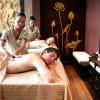CYBERMED LIFE - ORGANIC & NATURAL LIVING
CYBERMED LIFE - ORGANIC & NATURAL LIVING

Aromatherapy is the use of essential oils to promote healing and a feeling of well-being and relaxation in the recipient.The essential oils are extracted from the parts of herbs and plants and contain all the properties of the plants themselves. There are several ways of applying the oils, including adding the oils to your bath, or inhaling them, but the most popular and effective is through massage.
Once the oils are blended together the massage can begin. It can be a full body massage, taking in the back, chest, arms, legs, head and stomach, or a simple back massage or even a facial beauty massage. An aromatherapy massage should be gentle, but firm. It usually begins with the back, buttocks and legs before you turn over and the therapist massages the front.
The oil is applied in long sweeping strokes which warm the skin and muscles and prepare the body for deep tissue massage. Once the muscles are warmed, the masseur will continue with deeper massage, rolling and squeezing the skin and underlying muscles between the hands. Again, this should not be painful, but deeply relaxing.
During aromatherapy massage, the skin is warmed and the blood drawn to the surface, increasing circulation and encouraging the elimination of toxins from the body, which has the consequence of speeding up recovery time from any illness or injury. The manipulation of the muscles continues the process, whilst at the same time releasing tense knotted muscles by dispersing the build up of lactic acid which often occurs after exercise.
As the circulation increases, the oils are absorbed through the skin and carried round the body, allowing their healing effects to permeate to all the major body organs. Says Ali Headeach, aromatherapist from Margate, UK: "By the time the massage is over you should be deeply relaxed, and feeling calm. Sometimes people even fall sleep."
The effects of an aromatherapy massage can last up to 48 hours, depending on the oils used. The skin may feel slightly greasy, but the overall effect is one of deep calm and relaxation. It is not recommended to drive or drink alcohol after massage. You may be feeling too sleepy to drive, and some oils can increase the effect of alcohol, making you feel lightheaded after only one drink.
Very often, the benefits are immediately noticeable after a massage, but over time, it may be noticed that underlying or long-term problems have also been eased by massage. It is not recommended to have a full body massage more than once a week, but a weekly massage is an excellent way to keep the body relaxed and free of toxins.